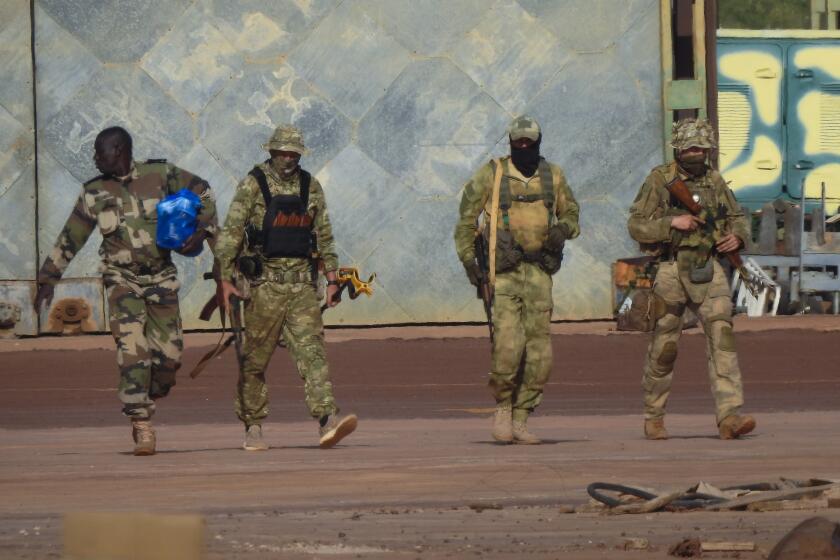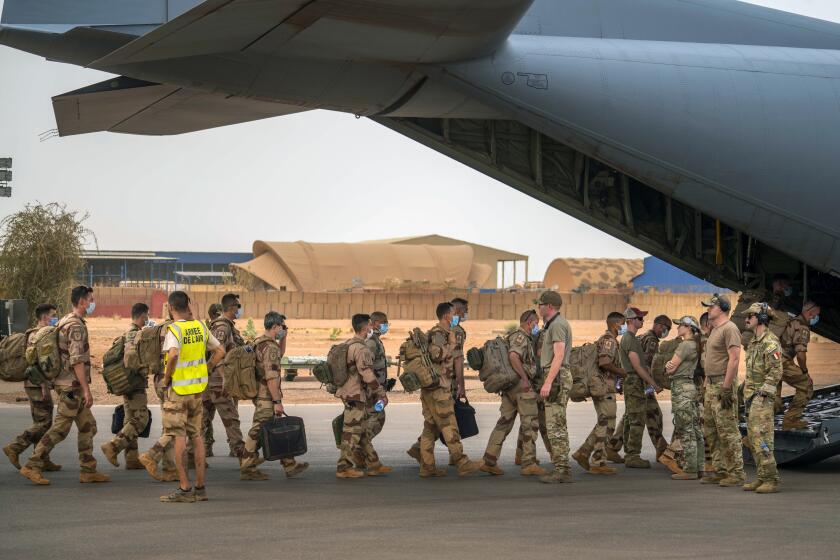Mali military camp attacked after Al Qaeda-linked insurgents kill 64 people

- Share via
BAMAKO, Mali — A military camp in Mali’s restive north was attacked Friday, a day after two separate assaults by Al Qaeda-linked insurgents killed 49 civilians and 15 government soldiers, the military said.
“Response and evaluation in progress,” the armed forces said in a brief statement about Friday’s attack on a Malian military camp in the Gao region.
Thursday’s attacks targeted a passenger boat near the city of Timbuktu on the Niger River and a Malian military position in Bamba farther downstream in the Gao region, the country’s military junta said in a statement read on state television. It said responsibility for the attacks was claimed by Jamaat Nusrat al Islam wal Muslimeenan, an umbrella coalition of armed groups aligned with Al Qaeda. The group issued a statement Friday saying it also attacked the military camp.
The Niger River serves as an important transportation route in Mali, where roads are inadequate.
Mali is ranked the sixth-least developed nation in the world, according to the United Nations’ human development index. Nearly half of the West African country’s 22 million people live below the national poverty line. The situation is worse in rural areas, where deadly jihadist attacks have threatened subsistence farming.
Thursday’s attack targeted a triple-decker passenger boat near the village of Zarho, about 55 miles east of Timbuktu. The statement said government forces killed about 50 assailants while responding to the attacks. It also declared three days of national mourning starting Friday to honor the civilians and soldiers killed in the attacks.
Western officials say violence against civilians in Mali has risen in the year since hundreds of Russian mercenaries have started working alongside the West African country’s armed forces to stem a decadelong insurgency by Islamic extremists
Malian army spokesman Souleymane Dembele attributed the high death toll to the inability of some of the boat’s passengers to swim, suggesting that some might have drowned. “When the boat was attacked, the soldiers on board exchanged fire with the terrorists. Unfortunately, many civilians who couldn’t swim jumped into the water,” Dembele told the Associated Press.
Al Qaeda-affiliated and Islamic State-linked groups have almost doubled the territory they control in Mali in less than a year, the United Nations said in a report last month, as they take advantage of a weak government and of armed groups that signed a 2015 peace agreement.
The stalled implementation of the peace deal and sustained attacks on communities have offered Islamic State and Al Qaeda affiliates a chance “to reenact the 2012 scenario,” they said.
That’s the year when a military coup took place in the West African country, and rebels in the north formed an Islamic statelet two months later. The extremist rebels were forced from power in the north with the help of a French-led military operation, but they moved from the arid north to more populated central Mali in 2015 and remain active.
French troops have been in Mali for nine years to help the West African nation battle Islamic extremists, but that military presence is to end.
In August 2020, Mali’s president was overthrown in a coup that included an army colonel who carried out a second coup and was sworn in as president in June 2021. He developed ties to Russia’s military and Russia’s Wagner mercenary group, whose head, Yevgeny Prigozhin, was killed in a plane crash in Russia on Aug. 23.
Timbuktu, a fabled desert city and a UNESCO World Heritage site, has been blockaded by armed groups since late August, when the Malian army deployed reinforcements to the region. The insurgents are preventing the desert city from being supplied with basic goods.
More than 30,000 residents have fled the city and a nearby region, according to an August report by the United Nations’ humanitarian agency.
The number of those in Mali who are affected by the violent attacks and are in need of humanitarian aid has grown by 17% over the last year to more than
8.8 million people, 1 million of whom require immediate food and health assistance, according to Whitney Elmer, deputy regional director for West and Central Africa at Mercy Corps, which has been assisting those in need. “It is a worsening situation, and it is hard to see things getting better in the immediate future,” Elmer said.
The deadly attacks come as the U.N. prepares to withdraw its 17,000-strong peacekeeping mission from Mali at the government’s request. The pullout is scheduled to be completed by the end of the year.
The U.N. deployed peacekeepers in 2013, and the Mali mission has become one of the international organization’s deadliest, with more than 300 personnel killed.
The growing insecurity in Mali has increased instability in West Africa’s volatile Sahel region.
More to Read
Sign up for Essential California
The most important California stories and recommendations in your inbox every morning.
You may occasionally receive promotional content from the Los Angeles Times.















